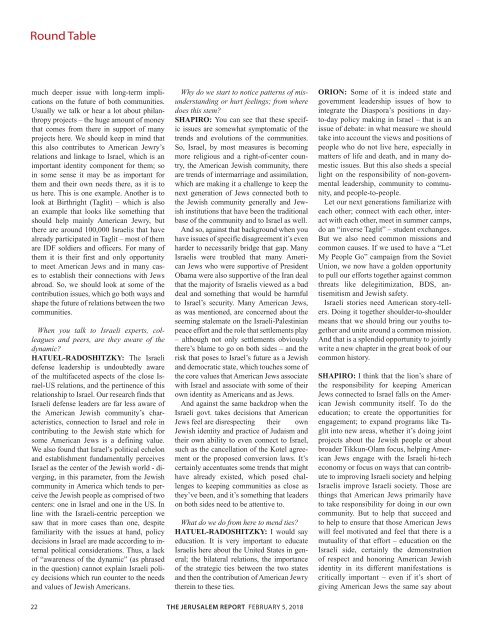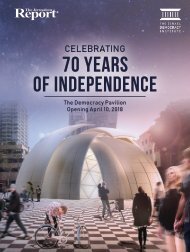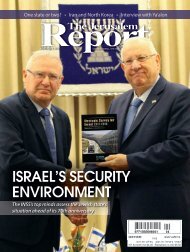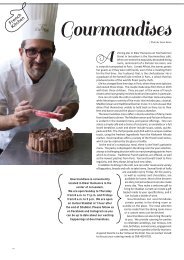All small
You also want an ePaper? Increase the reach of your titles
YUMPU automatically turns print PDFs into web optimized ePapers that Google loves.
Round Table<br />
much deeper issue with long-term implications<br />
on the future of both communities.<br />
Usually we talk or hear a lot about philanthropy<br />
projects – the huge amount of money<br />
that comes from there in support of many<br />
projects here. We should keep in mind that<br />
this also contributes to American Jewry’s<br />
relations and linkage to Israel, which is an<br />
important identity component for them; so<br />
in some sense it may be as important for<br />
them and their own needs there, as it is to<br />
us here. This is one example. Another is to<br />
look at Birthright (Taglit) – which is also<br />
an example that looks like something that<br />
should help mainly American Jewry, but<br />
there are around 100,000 Israelis that have<br />
already participated in Taglit – most of them<br />
are IDF soldiers and officers. For many of<br />
them it is their first and only opportunity<br />
to meet American Jews and in many cases<br />
to establish their connections with Jews<br />
abroad. So, we should look at some of the<br />
contribution issues, which go both ways and<br />
shape the future of relations between the two<br />
communities.<br />
When you talk to Israeli experts, colleagues<br />
and peers, are they aware of the<br />
dynamic?<br />
HATUEL-RADOSHITZKY: The Israeli<br />
defense leadership is undoubtedly aware<br />
of the multifaceted aspects of the close Israel-US<br />
relations, and the pertinence of this<br />
relationship to Israel. Our research finds that<br />
Israeli defense leaders are far less aware of<br />
the American Jewish community’s characteristics,<br />
connection to Israel and role in<br />
contributing to the Jewish state which for<br />
some American Jews is a defining value.<br />
We also found that Israel’s political echelon<br />
and establishment fundamentally perceives<br />
Israel as the center of the Jewish world - diverging,<br />
in this parameter, from the Jewish<br />
community in America which tends to perceive<br />
the Jewish people as comprised of two<br />
centers: one in Israel and one in the US. In<br />
line with the Israeli-centric perception we<br />
saw that in more cases than one, despite<br />
familiarity with the issues at hand, policy<br />
decisions in Israel are made according to internal<br />
political considerations. Thus, a lack<br />
of “awareness of the dynamic” (as phrased<br />
in the question) cannot explain Israeli policy<br />
decisions which run counter to the needs<br />
and values of Jewish Americans.<br />
Why do we start to notice patterns of misunderstanding<br />
or hurt feelings; from where<br />
does this stem?<br />
SHAPIRO: You can see that these specific<br />
issues are somewhat symptomatic of the<br />
trends and evolutions of the communities.<br />
So, Israel, by most measures is becoming<br />
more religious and a right-of-center country,<br />
the American Jewish community, there<br />
are trends of intermarriage and assimilation,<br />
which are making it a challenge to keep the<br />
next generation of Jews connected both to<br />
the Jewish community generally and Jewish<br />
institutions that have been the traditional<br />
base of the community and to Israel as well.<br />
And so, against that background when you<br />
have issues of specific disagreement it’s even<br />
harder to necessarily bridge that gap. Many<br />
Israelis were troubled that many American<br />
Jews who were supportive of President<br />
Obama were also supportive of the Iran deal<br />
that the majority of Israelis viewed as a bad<br />
deal and something that would be harmful<br />
to Israel’s security. Many American Jews,<br />
as was mentioned, are concerned about the<br />
seeming stalemate on the Israeli-Palestinian<br />
peace effort and the role that settlements play<br />
– although not only settlements obviously<br />
there’s blame to go on both sides – and the<br />
risk that poses to Israel’s future as a Jewish<br />
and democratic state, which touches some of<br />
the core values that American Jews associate<br />
with Israel and associate with some of their<br />
own identity as Americans and as Jews.<br />
And against the same backdrop when the<br />
Israeli govt. takes decisions that American<br />
Jews feel are disrespecting their own<br />
Jewish identity and practice of Judaism and<br />
their own ability to even connect to Israel,<br />
such as the cancellation of the Kotel agreement<br />
or the proposed conversion laws. It’s<br />
certainly accentuates some trends that might<br />
have already existed, which posed challenges<br />
to keeping communities as close as<br />
they’ve been, and it’s something that leaders<br />
on both sides need to be attentive to.<br />
What do we do from here to mend ties?<br />
HATUEL-RADOSHITZKY: I would say<br />
education. It is very important to educate<br />
Israelis here about the United States in general;<br />
the bilateral relations, the importance<br />
of the strategic ties between the two states<br />
and then the contribution of American Jewry<br />
therein to these ties.<br />
ORION: Some of it is indeed state and<br />
government leadership issues of how to<br />
integrate the Diaspora’s positions in dayto-day<br />
policy making in Israel – that is an<br />
issue of debate: in what measure we should<br />
take into account the views and positions of<br />
people who do not live here, especially in<br />
matters of life and death, and in many domestic<br />
issues. But this also sheds a special<br />
light on the responsibility of non-governmental<br />
leadership, community to community,<br />
and people-to-people.<br />
Let our next generations familiarize with<br />
each other; connect with each other, interact<br />
with each other, meet in summer camps,<br />
do an “inverse Taglit” – student exchanges.<br />
But we also need common missions and<br />
common causes. If we used to have a “Let<br />
My People Go” campaign from the Soviet<br />
Union, we now have a golden opportunity<br />
to pull our efforts together against common<br />
threats like delegitimization, BDS, antisemitism<br />
and Jewish safety.<br />
Israeli stories need American story-tellers.<br />
Doing it together shoulder-to-shoulder<br />
means that we should bring our youths together<br />
and unite around a common mission.<br />
And that is a splendid opportunity to jointly<br />
write a new chapter in the great book of our<br />
common history.<br />
SHAPIRO: I think that the lion’s share of<br />
the responsibility for keeping American<br />
Jews connected to Israel falls on the American<br />
Jewish community itself. To do the<br />
education; to create the opportunities for<br />
engagement; to expand programs like Taglit<br />
into new areas, whether it’s doing joint<br />
projects about the Jewish people or about<br />
broader Tikkun-Olam focus, helping American<br />
Jews engage with the Israeli hi-tech<br />
economy or focus on ways that can contribute<br />
to improving Israeli society and helping<br />
Israelis improve Israeli society. Those are<br />
things that American Jews primarily have<br />
to take responsibility for doing in our own<br />
community. But to help that succeed and<br />
to help to ensure that those American Jews<br />
will feel motivated and feel that there is a<br />
mutuality of that effort – education on the<br />
Israeli side, certainly the demonstration<br />
of respect and honoring American Jewish<br />
identity in its different manifestations is<br />
critically important – even if it’s short of<br />
giving American Jews the same say about<br />
22<br />
THE JERUSALEM REPORT FEBRUARY 5, 2018
















